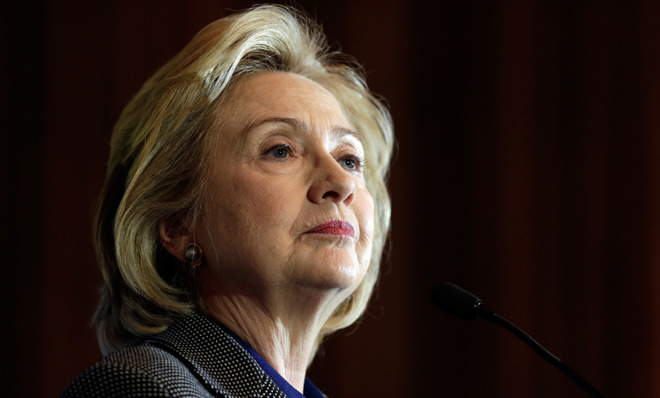Did Hillary Clinton ever stop running for president?


A free daily email with the biggest news stories of the day – and the best features from TheWeek.com
You are now subscribed
Your newsletter sign-up was successful
In a new episode of the Political Wire podcast, reporters Jonathan Allen and Amie Parnes, co-authors of HRC: State Secrets and the Rebirth of Hillary Clinton, joined us for a fascinating look at the likely presidential candidacy of arguably the most powerful woman in U.S. political history.
Here are five takeaways:
1. Clinton is all but certain to run in 2016: Although Hillary Clinton long denied that she would be running for president again after her loss to Barack Obama in 2008, she has quietly laid the groundwork for another presidential bid, Allen said. While secretary of State, she continued to build her political operation while Bill went around the world doing public service and political campaigning to keep the Clinton brand healthy. "It's more a question of whether she'll stop than whether she'll start," Allen said.
The Week
Escape your echo chamber. Get the facts behind the news, plus analysis from multiple perspectives.

Sign up for The Week's Free Newsletters
From our morning news briefing to a weekly Good News Newsletter, get the best of The Week delivered directly to your inbox.
From our morning news briefing to a weekly Good News Newsletter, get the best of The Week delivered directly to your inbox.
2. She would be unlikely to face a major nomination challenge from the left: Obama has disappointed progressives in some ways, particularly on foreign policy, thanks to the Afghanistan surge and the military action in Libya. Progressives' discontent on this issue could create an opening for a dovish person on the left to challenge Clinton, who was relatively hawkish in her 2008 run and whose time as secretary of State links her to the president. The problem for progressives: They have yet to find a good candidate. And even if they do, Clinton's centrist streak hasn't thwarted her strong ties with key liberal voting groups such as Latinos and women. It's hard to see a serious challenge from Clinton's left emerging, at least as of now, Allen said: "That doesn't mean we won't see that happen in the next couple of years. But I think the progressives are scrambling for a candidate right now and haven't found one."
3. Expect Republicans to throw old Clinton baggage at her and continue the Benghazi drumbeat: There's already significant talk among Republicans of heightening their attacks on Clinton over her response to the Benghazi terror attacks, should she run, Parnes said. Also expect baggage from Clinton's White House years to be revived, and expect additional secrets about her to come out, Parnes said, as highlighted by the recent release of papers that a close friend of Clinton's had written. A key area of disagreement among Republicans, Parnes said, is whether to make an issue out of her husband's affair with Monica Lewinsky. One thing is clear, Parnes said: "I think the one thing that will really come back to haunt her is Benghazi."
4. If Clinton is elected, her experience could serve as boon and as a bane: Clinton's resume is chock full of positions in the U.S. government, ranging from head of the Legal Services Corporation under Jimmy Carter, to U.S. first lady, to U.S. senator, to the nation's top diplomat. Said Allen: "Nobody's run for president with a resume like that, probably, since the early years of our country." That type of experience brings with it knowledge of how to pull the right levers of government, making it easier to get things done. But when presidents have that ability, they sometimes take it too far and anger the public. Allen cited Lyndon Johnson and Richard Nixon and their roles in the Vietnam War and the Watergate scandal, respectively. It's a cautionary lesson for Clinton: "The possibility for success in understanding how to manipulate the levers of power, and the possibility for failure and doing things that the public doesn't like are both great in her."
5. Even if experience helps her as a candidate, she also needs to articulate a vision: Experience could still be an important asset for Clinton on the campaign trail. But it wouldn't be a silver bullet. She knows that from experience, Allen suggested: "I don't expect Hillary Clinton to run and say, 'Elect me, I'm the most experienced.' She tried that in 2008, and that failed." Also, this time many voters are disgusted with Washington and might be hesitant to vote for a veteran of the city's political scene. What may be key for Clinton, Allen said, is the vision that she articulates and how she plans to guide the nation there in a time of partisan gridlock.
A free daily email with the biggest news stories of the day – and the best features from TheWeek.com
Listen to the entire conversation:
Subscribe via iTunes or RSS to get episodes automatically downloaded.
Taegan D. Goddard is the founder of Political Wire, one of the earliest and most influential political websites. He also runs Wonk Wire and the Political Dictionary. Goddard spent more than a decade as managing director and COO of a prominent investment firm in New York City. Previously, he was a policy adviser to a U.S. senator and governor. Goddard is also co-author of You Won — Now What? (Scribner, 1998), a political management book hailed by prominent journalists and politicians from both parties. Goddard's essays on politics and public policy have appeared in dozens of newspapers across the country, including The Washington Post, USA Today, Boston Globe, San Francisco Chronicle, Chicago Tribune, Philadelphia Inquirer, and Christian Science Monitor. Goddard earned degrees from Vassar College and Harvard University. He lives in New York with his wife and three sons.
